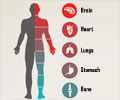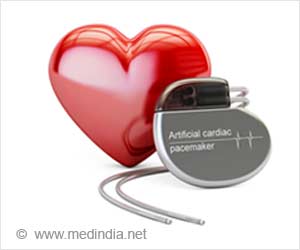New study demonstrates the potential for the U-RHYTHM device, wearable device analysing stress hormone levels in blood samples from healthy volunteers over 24 hours.

‘Looking into healthy hormonal rhythms in real world settings, could form a baseline for better ways to diagnose hormonal conditions at a much earlier stage.#stress #hormone level #blood test’





The technology published in Science Translational Medicine (1✔ ✔Trusted SourceHigh-resolution daily profiles of tissue adrenal steroids by portable automated collection
Go to source) shows how tracking adrenal steroid levels at high resolution and over an extended period can provide better information about how hormone levels change across daily (circadian) and faster (ultradian) periods.
Stress hormones such as the hormone cortisol are crucial for life. Disturbance of their rhythms due to disease and lifestyle factors is related to diseases like depression, heart disease, obesity, diabetes, and even critical illness. However, until now scientists have not been able to define what normal rhythmicity looks like in healthy daily life.
A major problem has been that understanding the meaning of a hormone test is very difficult or impossible if only a single time point is taken since this fails to consider hormonal rhythms. This in turn leads to diagnostic delays and missed opportunities for treatment intervention (2✔ ✔Trusted Source
The human stress response
Go to source).
Previously the only way to build an accurate picture has been to take multiple samples of blood during admission to a hospital or research unit, which is not only time-consuming and inconvenient but also stressful.
Blood-Free Sensor Can Detect Early Signs of Hormonal Diseases More Accurately
U-RHYTHM has been developed by scientists from the University of Bristol, designed by the company Designworks Windsor, and available through the University of Bristol spin-out company Dynamic Therapeutics.The wearable device is worn around the waist and painlessly and automatically samples from beneath the skin every 20 minutes, without the need to collect blood. Importantly, the method allows sampling during sleep, work, and other daily life activities for up to 72 hours in a single session.
Advertisement
Mathematicians used these data to develop a new class of “dynamic markers” to better understand how a healthy hormonal profile should look depending on an individual’s sex, age, body mass index, as well as other characteristics.
Advertisement
This is a fascinating new technology that is enabling us to make discoveries about how hormonal regulation works, while the mathematical analysis is enabling us to generate new ideas about precision diagnosis and design personalized medicine interventions that better support patients.
The ability to measure the dynamics of hormone secretion across the day and night in patients in their own homes will not only improve our ability to accurately diagnose any abnormality (3✔ ✔Trusted Source
Quantification of microdialysis related variability in humans: Clinical trial design recommendations
Go to source) in hormone secretion without the need for complex inpatient investigations but the whole diagnostic procedure can be performed from primary care and linked to newly available diagnostic algorithms.
This will not only provide good, personalized medicine but will also allow the patient to follow their hormone profiles during diagnosis and therapy and empower better patient-doctor discussions.
References:
- High-resolution daily profiles of tissue adrenal steroids by portable automated collection - (https://www.science.org/doi/10.1126/scitranslmed.adg8464)
- The human stress response - (https://www.nature.com/articles/s41574-019-0228-0)
- Quantification of microdialysis related variability in humans: Clinical trial design recommendations - (https://www.sciencedirect.com/science/article/abs/pii/S092809872030395X)
Source-Eurekalert















